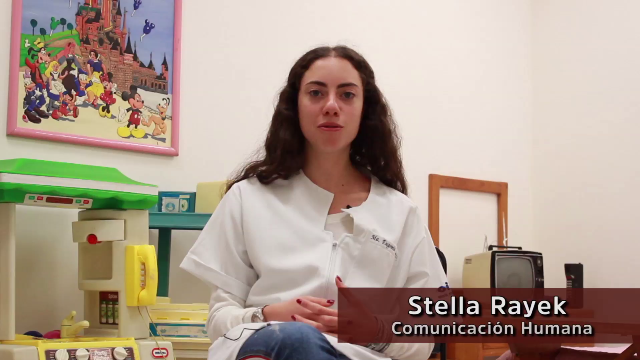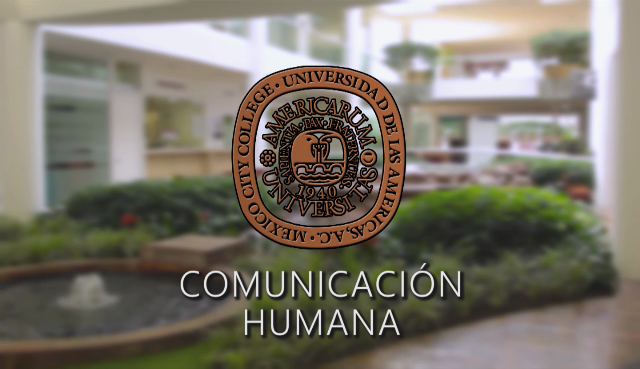Recognition of Official Validity of Studies by the Ministry of Public Education (SEP), 901013 dated on September 21, 1990.
The Universidad de las Américas de la Ciudad de México, offers the most prestigious and oldest program in Licenciatura en Comunicación Humana in the country, This program has, as part of its facilities, one of the most important national clinics (Clínica OIRA) to enable its students to conduct professional practices.
What does a graduate in Human Communication Disorders do?
The bilingual professional training provided by the Universidad de las Américas de la Ciudad de México will enable you to work as:
- A therapist in clinical scenarios (private practice offices, special education clinics, health centers and public and private hospitals)
- A therapist in educational scenarios (special education schools and regular education schools)
- A teacher in educational institutions
- A researcher in public and private centers
- In associations and foundations for the training of people with special needs
- Private Practice
Objective
-
The student will be able to integrate fundamental theoretical and methodological knowledge to make diagnosis and clinical intervention of people with disorders in the areas of speech and language, learning and hearing; and to propose augmentative and alternative communication systems, when necessary; and to provide guidance to the family, teachers and / or employers of these people to promote their appropriate inclusion in the family, school and / or work areas.
-
The student will be able to practice their profession with ethics and responsibility, making decisions for the benefit of people who attend, showing, in every moment, professionalism, honesty, respect for human dignity and tolerance for individual differences
Enrollment Profile
To enroll into this bachelor's degree the applicant shall comply with the general requisites of admission to the University, as well as with the following specific characteristics:
- Oral and written communicative competence
- Reading comprehension
- Critical thought
- Ability for problem solving
- Capability of developing empathy for other people during interaction with them
- An attitude of respect and tolerance toward individual physical, cognitive and ideological differences, as well as diverse beliefs or convictions
- Attitudes which demonstrate social co-responsibility
- A commitment to a permanently ongoing professional training project
Graduation Profile
The graduate will be able to make diagnosis and clinical intervention of people with disorders in the areas of speech and language, learning and hearing; and to propose augmentative and alternative communication systems, where necessary; and to provide guidance to the family, teachers and / or employers of these people to promote their appropriate inclusion in the family, school and / or work areas. All this will be done with ethics and responsibility, making decisions for the benefit of people who attend, showing, in every moment, professionalism, honesty, respect for human dignity and tolerance for individual differences.
Therefore, at the time of completion, the graduate will have acquired the following knowledge, skills, attitudes and abilities:
Knowledge:
- About the general areas of Special Education.
- About the specific areas of Special Education associate with human communication: language, speech, learning and hearing.
- About the normal and abnormal development of the language and speech, cognitive processes and socio affective processes and the capabilities and processes associate with hearing.
- About the characteristics of the language, speech, learning and hearing disorders.
- About the procedures for the development of diagnosis process in the case of language, speech, learning and hearing disorders.
- About the formal and informal instruments for the diagnosis of the language, speech, learning and hearing disorders.
- About the methods and intervention strategies for the attention of the language, speech, learning and hearing disorders.
- About the main augmentative and alternative systems for the language, speech, learning and hearing disorders.
- About the procedures for the attention of children and adults in the audiological cabinet.
- About the quantitative and qualitative research methods, as well as the characteristics of the types of study more relevant in the field of human communication.
In order to be able to apply the foregoing knowledge, the graduate shall possess sufficient skills for:
- Spoken and written communication both Spanish and English
- Logical reasoning
- Inferential and Prospective Analysis
- Elaboration of arguments
- Problem Solving
- Decision Making
- Interdisciplinary Collaborative work
The graduate shall display the following attitudes:
- Respect to human dignity
- Tolerance for individual differences
- Empathy with others
- Honesty and responsibility
- Social responsibility
The graduate shall demonstrate possession of abilities to:
- Conduct diagnostic processes of children and adults with human communication disorders.
- Elaborate clear, precise and complete diagnosis reports
- Design intervention as of the diagnosis result in the case of people with human communication disorders
- Conduct individual intervention for people with human communication disorders.
- Provide specific guidance for the inclusion of people with human communication disorders
- Conduct audiological studies to children and adults
- Participate in research projects related to human communication disorders
Curriculum
- Three year program.
- 52 courses
- Practical learning exercises start on the first semesters.
- Individually supervised clinical practices start on the third semester.
- Mandatory courses in the English language from the first semester.
- Major subjects in English starting on the third semester.
- One choice of Cultural Workshop in the first semester
- Total Program´s Credits: 332.
- General Knowledge component: 59 credits (includes 6 credits from 3 mandatory general knowledge courses with no charge).
- Curricular courses taught in English are indicated by italics.
|
First Semester |
||||||
|
Special Education |
6 |
|||||
|
Developmental Psychology |
6 |
|||||
|
Bases of Human Communication |
6 |
|||||
|
Normal Language Development |
6 |
|||||
|
Development and Learning Evaluation |
6 |
|||||
| EG103 | Writing I | 6 | ||||
| EG106 | Personality and Self-Esteem | 2 | ||||
| EG107 | Food and Health | 2 | ||||
| EG113 | Mexican Culture | 2 | ||||
| MA105 | Mathematics | 6 | ||||
| EN111 | Remedial English I | 7 | ||||
|
Second Semester |
||||||
|
Observation of Clinical Standards |
6 |
|||||
|
Physiological Aspects of Exceptionality |
6 |
|||||
|
Myofunctional Diagnosis and Intervention |
6 |
|||||
|
Diagnosis and Intervention in Speech Disorders |
6 |
|||||
|
Written Language |
6 |
|||||
|
Computational Tools |
7 |
|||||
|
Writing II |
6 |
|||||
| EN121 | Remedial English II | 7 | ||||
|
Summer 1 |
||||||
|
Diagnosis and Intervention in Language Problems |
6 |
|||||
|
Observation of Intervention in Speech and Language |
2 |
|||||
|
Teaching Methods in Mathematics |
6 |
|||||
| EN231 | Remedial English III | 7 | ||||
|
Third Semester |
||||||
|
Neuromotor Development |
6 |
|||||
|
Neuropsychology |
6 |
|||||
|
Learning Problems |
6 |
|||||
|
Hearing, Acoustic and Audiology |
6 |
|||||
|
Communication Disorders Related to Other Conditions * |
6 |
|||||
|
Practicum: Language Disorders I |
12 |
|||||
| EN241 | Remedial English IV | 7 | ||||
|
Fourth Semester |
||||||
|
Behavioral Misconduct * |
6 |
|||||
|
Formal Assessment of Visual Motor Cognition and Maturity |
6 |
|||||
|
Evaluation of Academic Performance and Conduct Auditory Verbal Method |
6 |
|||||
|
Auditory Verbal Method |
6 |
|||||
|
Education of the Hearing Impaired |
6 |
|||||
|
Practicum: Language Disorders II |
12 |
|||||
| EN351 | Remedial English V | 7 | ||||
|
Summer 2 |
||||||
|
Diagnosis and Intervention in Learning Disabilities * |
6 |
|||||
|
Observation of Learning Intervention |
2 |
|||||
|
Observation of Hearing Intervention |
2 |
|||||
|
Educational Evaluation of the Hearing Impaired * |
6 |
|||||
|
Research Methodology and Statistics * |
6 |
|||||
| EN361 | Remedial English VI | 7 | ||||
|
Fifth Semester |
||||||
|
Augmentative and Alternative Communication Systems * |
6 |
|||||
|
Practicum: Learning Disabilities I |
12 |
|||||
|
Intervention with Adults |
6 |
|||||
|
Practicum: Hearing Impairment I |
12 |
|||||
| EN451 | Remedial English VII (TOEFL Preparation) | 7 | ||||
|
Sixth Semester |
||||||
|
Practicum: Learning Disabilities II |
12 |
|||||
|
Practicum: Hearing Impairment II |
12 |
|||||
|
Audiology and Hearing Aid Practice * |
6 |
|||||
|
Integrative Practice |
6 |
|||||
|
||||||
Program Advantages
-
Double Accreditation: Bachelor of Science in Human Communication Disorders Diploma, fully recognized in the United States of America and Licenciatura en Comunicación Humana Diploma Degree with official recognition from the Ministry of Public Education (SEP)
-
Our professors possess a Master's and/or Doctorate degree and wide professional experience, which will offer you the invaluable opportunity to learn from their theoretical and practical knowledge
-
Practices in our Clínica OIRA, located within the facilities of the Universidad de las Américas, Mexico City, start on the third semester and are conducted under individual professional supervision
-
One of the most prestigious national clinics (Clínica OIRA) as part of the University’s facilities
-
Conference cycles and extracurricular activities
-
Employment connections and job placements
Professors
Academic Coordinator: Concepción Rodriguez Ochoa, MA
-
Juan Leobardo Bribiesca Ruiz, MA (Full-time Undergraduate Professor)
-
Mariana Gordillo Morales, MA (Full-time Undergraduate Professor)
Contact / Additional Information
Concepción Rodriguez Ochoa, MA: Phone 55-5209 9830 / 55-5209 9848,
E-mail: This email address is being protected from spambots. You need JavaScript enabled to view it.
Information and Admissions Department: Phone 55-5209-9858 / 55-5209-9807 / 55-5207-0423,
E-mail: This email address is being protected from spambots. You need JavaScript enabled to view it.
Allow us to provide a superior service, share your name and email with us.




